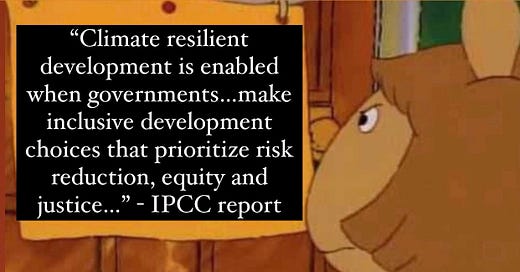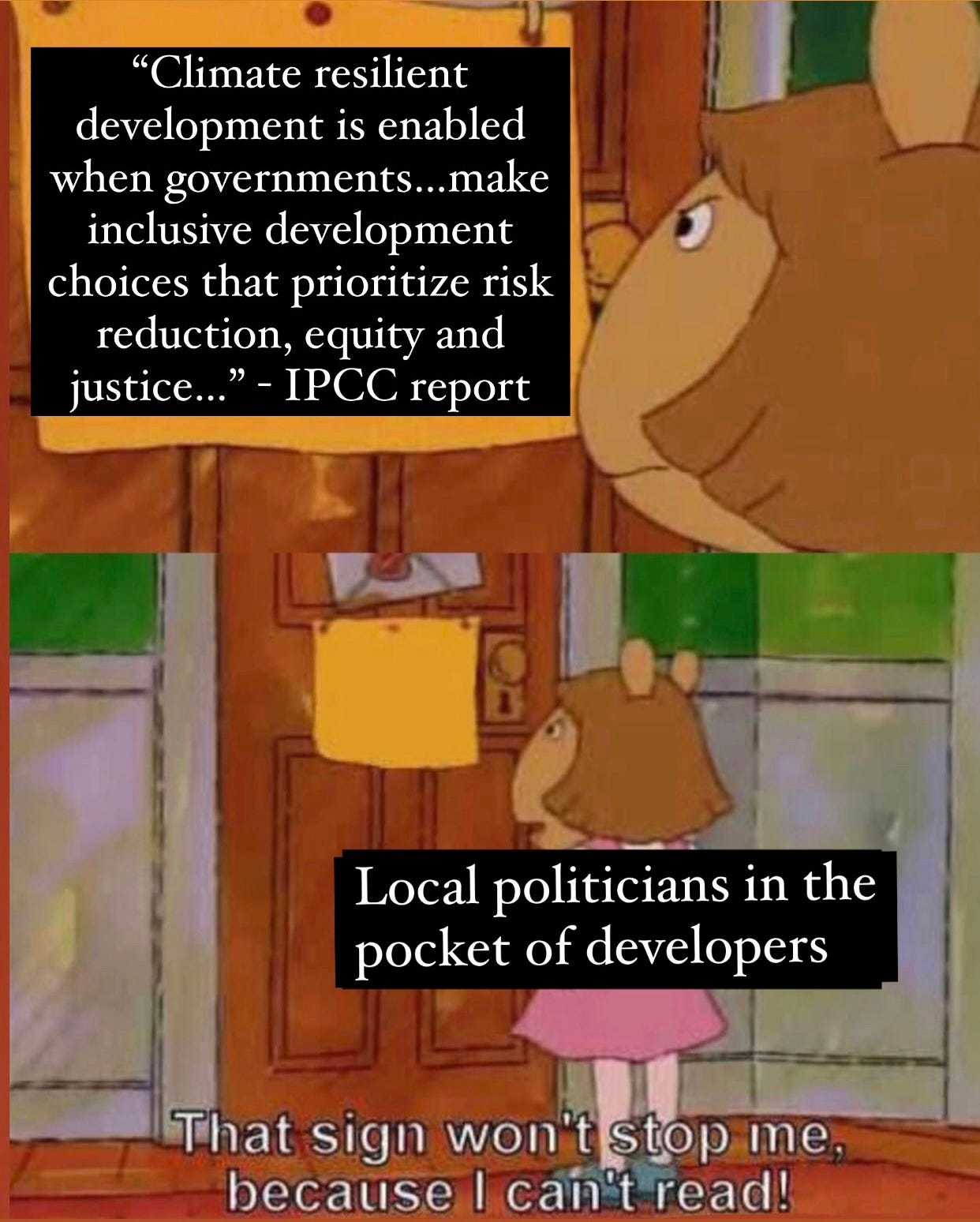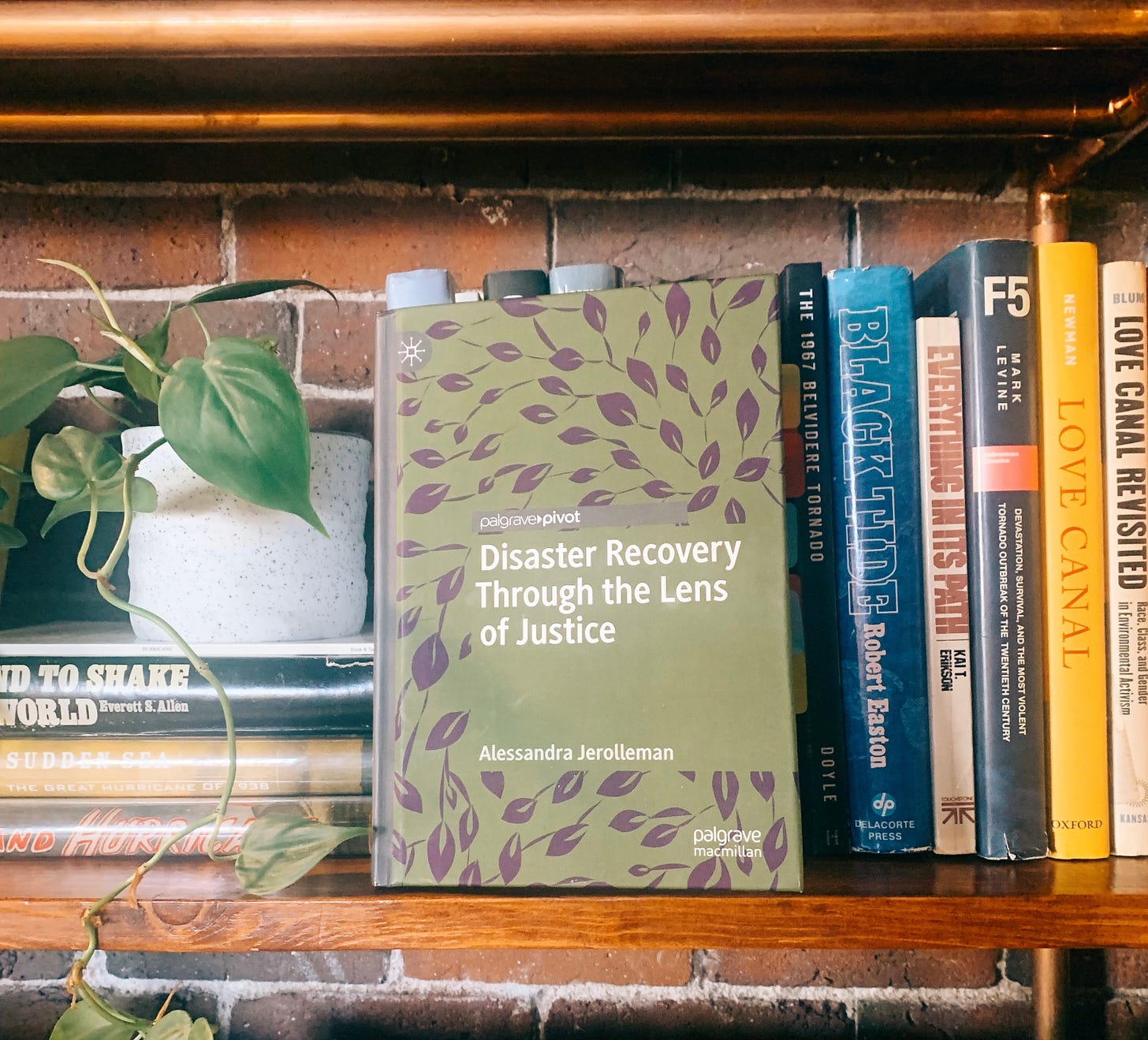February 2022
This newsletter is a compilation of recent disaster ~things~ that I think are cool, important, or otherwise of interest to people who are intrigued with disaster (broadly defined).
There’s a little something for everyone!
So, you’ve decided to take a break from your doomscrolling to read this month’s Disasterology Newsletter – good for you!
The State of Emergency Management
The state of emergency management is sobbing in a corner? I’m kidding, hopefully. Idk. How y’all doing? Things are once again bleak ~gestures around at literally everything~. I’m going to do something radically out of character and not go through the list of terrible things happening around the world and will focus instead on what we’re going to do about it all.
Disaster Justice
Storytime.
In the very early days of the pandemic, amid disaster researchers melting down over the cataclysmic government response, disaster historian Dr. Scott Knowles sent me a message that said, “We need a union of concerned scientists but for disaster”. Without hesitation I said “yup!” and called fellow emergency management researcher Dr. Njoki Mwarumba who I knew would be extremely into the idea. Then it took months for us to get ourselves organized (due to, you know, the raging pandemic).
We started bringing the idea up to other disaster researchers over late-night zoom calls. I started mentioning it any time I spoke to an emergency manager or someone who does community-based work. Nearly everyone responded positively — and with a very long list of projects and issues, they thought the group could address. During these conversations, we were able to hear about the work disaster researchers are already doing related to disaster justice. We also heard a lot about the barriers and challenges to them being able to do and grow that work. We also heard from researchers who want to do this kind of justice-oriented work but don’t know where to start.
Our ideas about what this group could be evolved until it finally formed itself into Disaster Researchers for Justice.
We spent a lot of time talking with disaster researchers from different disciplines about what we actually meant by ‘justice’ (not academics debating definitions lol). We spent time exploring what justice in a disaster context means including the long history of social justice and the environmental justice movement. We talked about how the intersecting concepts of racial justice, economic justice, gender justice, and disability justice play out in the disaster context. We talked about the emergence of the term “climate justice”. We also explored how each of our disciplines would define ‘disaster justice’ — the differences and similarities. You can read our conclusions, which are very much a work in progress, here.
One of the final chapters in my book is entitled “Disaster Justice”. (Atmos published the chapter here.) In it, I shared how I came to see the connections between various social movements and the injustices within our emergency management system. A key conclusion from my experience is that outside of academia:
“There are absolutely people around the country (and world) who are already doing this work, but the efforts in one place are not being connected back to the work being done in other places in any strategic way. And so, in the absence of a broader movement it is easy not to recognize our power – and we do have power.”
What I left out in that chapter is that it isn’t only activist groups who need to connect with one another, it’s disaster researchers too. For many reasons, our work has been siloed and if we want to make an impact – to use our collective power in the name of justice – then we too need to organize.
What Disaster Researchers for Justice does most simply is explicitly state that it’s not only the job of survivors, community organizers, and activists to advocate for disaster justice – we as researchers also have a moral obligation to do so.
We are just at the very beginning of this group and all ideas are welcome. Currently, we’re pulling together leadership teams to organize across five areas: Media Engagement; Support for Community-Based Organizations; Research Advocacy; Disaster Education & Training; and Policy & Governance. (More on all of this soon!)
I invite all of you to check out the DRJ website and sign-up. Your involvement can range from just getting some e-mail updates now and then to taking on a leadership role within the group to bringing forward an idea for a project that you need supported. While this group is oriented towards researchers there is absolutely room for everyone. If you’re an emergency manager, elected official, or a part of a community group who wants to collaborate, let’s talk!
If you have any interest at all please sign-up and we will work with you to find how you can best fit into this work.
And one final thank you to all the people who have already dedicated their time to creating this group. I’m so excited to see how it grows in the future.
In Climate News…
Today the Intergovernmental Panel on Climate Change (IPCC) released their report on Impacts, Adaptation, and Vulnerability. (These are the findings from Working Group II of the Sixth Assessment. You’ll remember Working Group I released their piece of the report last August.) This is the piece of the report that is most directly relevant to emergency management.
The purpose is to outline the impacts from climate change that people are already experiencing around the world and will continue to experience, future vulnerability and risk, and what is being done to adapt to the changes. If you’re not interested in reading the full 3675-page report, you can read a plain English summary from Earther here and look at a visual summary here.
As you can imagine, the report itself is not an uplifting read. The UN secretary general described it as “an atlas of human suffering” which even made me say “yikes”. But it is important to read through, particularly if you are working in emergency management. While obviously climate impacts will vary from community to community, having a big picture understanding of the world we are walking into is invaluable for envisioning what emergency management needs to become.
Meme Break
The Book of The Month
“Disaster Recovery Through the Lens of Justice” by Dr. Alessandra Jerolleman
Hopefully, this month’s newsletter has inspired you to explore disaster justice in more depth. If so, this book is the perfect place to start. Dr. Jerolleman lays out how to apply a justice framework to disaster recovery. This includes discussions of how to conceptualize justice, the agency of disaster survivors, the need to incorporate a justice perspective into public policy, and more. This is an academic text, but it is quite accessible.
You can read more about it here and buy the book through the publisher here. (It is expensive but don’t forget you can always request these book recommendations through your local library.)
Important Disaster Media Coverage This Month
There were some good and important disaster-related stories this month which I’ve listed below. Before you get to those I wanted to draw your attention to this particular interview between Collen Hagerty and Susamma Seeley for My World’s On Fire about who gets to make decisions in emergency management.
Mitigation
Climate and Punishment by Alleen Brown for The Intercept
How billions in infrastructure funding could worsen global warming by Brad Plumer for The New York Times
Fuel spill in Portland after a major earthquake could be bigger than Deepwater Horizon, study finds by Monica Samayoa for Oregon Public Broadcasting
It’s not just climate: Are we ignoring other causes of disasters? By Fred Pearce for Yale Environment 360
Lessons from New York: What makes a community turn against climate adaptation? By Zoya Teirstein for Grist
Preparedness
Race excluded as White House rolls out climate justice screening tool by Drew Costley for ABC News
The tsunami could kill thousands. Can they build an escape? By Mike Baker for The New York Times
Response
Here’s how disaster declarations work – and why aid takes so long by Amal Ahmed for Southerly
Communication problems hindered L.A.’s emergency COVID-19 response, report finds by Dakota Smith for Los Angeles Times
Emergency alerts were a problem long before the Marshall fire, reports show by Shannon Najmabadi and Olivia Prentzel for The Colorado Sun
Understanding the Ukraine Crisis: A Comprehensive Reading List by Henrikas Bliudzius for Literary Hub
Recovery
Songs for a South underwater by Sergio Lopez for SCALAWAG Magazine
FEMA to start tracking race of disaster-aid applicants by Thomas Frank for E&E News
“I have nowhere to go”: This woman lost her New Jersey apartment due to Ida’s flooding. Government officials just evicted her from her temporary housing by Zahra Hirji for Buzzfeed
Mold, leaks, rot: how Brad Pitt’s post-Katrina housing project went horribly wrong by Wilfred Chan for The Guardian
Biden admin. bets on renewable energy to revamp Puerto Rico’s electric system by Nicole Acevedo for NBC News
‘Real solutions to root issues’: Making hurricane recovery more equitable by Michael Esealuka for Southerly
Volcano-Ravaged Tonga is back online after 5-week internet outage by Mack DeGeurin for Gizmodo
Some Entertainment News
The superior “comet crashes to earth” disaster movie, Greenland, is finally getting the attention it deserves across streaming platforms.
The End Bits
I would love it if you’d forward this to your friends, post on social media, and undertake any other form of newsletter sharing you deem appropriate. They can sign-up here.
In case you signed up for this newsletter without knowing who I am (a bold choice!) you can read my book Disasterology: Dispatches From The Frontlines of The Climate Crisis to catch up! You can read a USA Today review here, order it here, or get it as an audiobook here. You can also find more from me on my blog, listen to this episode of Ologies, or follow me on Twitter and Instagram where I impulsively narrate my every thought.
Finally, this newsletter is ~FREE~. I plan on keeping it that way because eliminating barriers to disaster knowledge is important. However, I’ve created a “paid subscriber” option for $5 a month or whatever you’d like to give if you’re interested in supporting this work.





